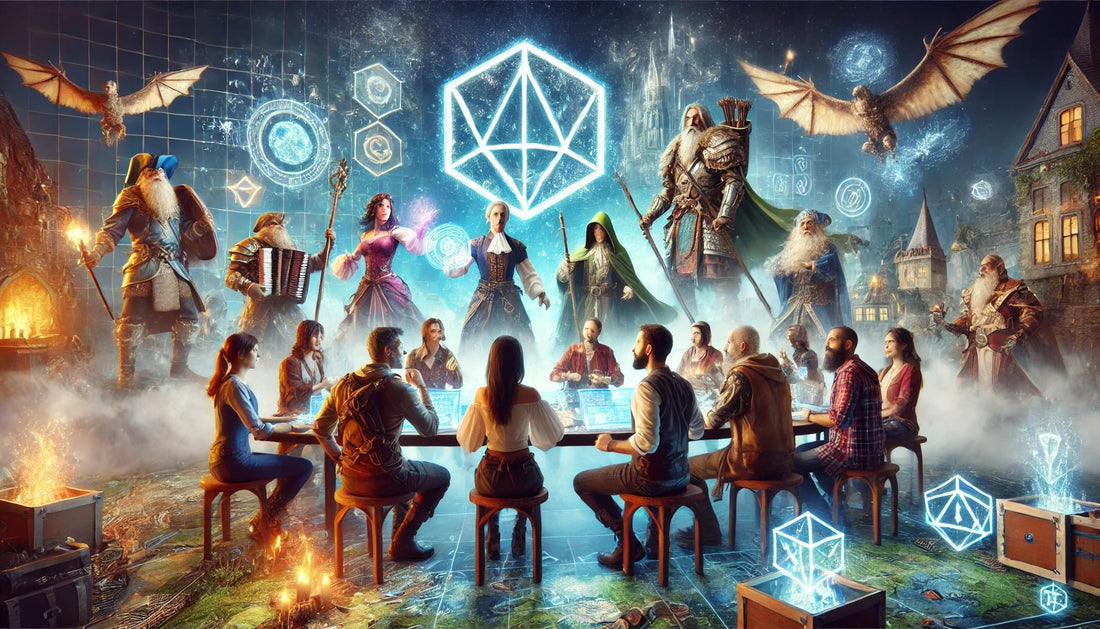
Embarking on an Epic Journey: How to Run a Successful Online RPG Campaign
Share
In a realm where imagination reigns supreme and the boundaries between reality and fantasy blur, an online RPG campaign stands as the gateway to endless adventures. Picture this: a band of heroes, each unique and brimming with potential, united not by geography but by a shared passion for storytelling and camaraderie. Welcome to the enchanting world of online RPGs, where the only limit is the sky—or perhaps, your Wi-Fi connection.
Whether you're a seasoned dungeon master or a fledgling storyteller, this guide will equip you with the tools and wisdom to craft an unforgettable online RPG campaign. So, grab your virtual dice, don your wizard's hat, and let's embark on a journey to master the art of digital adventure!
Chapter 1: Gathering Your Fellowship
1.1 Choosing Your Companions
Every great adventure begins with a fellowship, a band of heroes ready to face the unknown together. When forming your party, consider the diversity of skills, interests, and personalities. Just as a balanced team of characters enhances the gameplay, a well-rounded group of players ensures a richer and more dynamic campaign.
Reach out to friends, fellow gamers, or join online communities to find kindred spirits. Platforms like Discord, Roll20, and Reddit are teeming with potential adventurers eager to join your quest.
1.2 Setting the Stage
Once your fellowship is assembled, it's time to lay the foundation. Discuss expectations, preferred game styles, and commitment levels. Are your players in for a high-stakes, combat-heavy saga, or do they crave intricate political intrigue and character development? Establishing a common vision helps align everyone's expectations and paves the way for a harmonious campaign.
1.3 Choosing the Right Tools
In the digital age, a plethora of tools awaits the modern dungeon master. Here are some essentials to get you started:
- Virtual Tabletop (VTT) Platforms: Roll20, Fantasy Grounds, and Foundry VTT are popular choices, each offering unique features to enhance your game.
- Communication Tools: Discord, Zoom, or Skype are excellent for voice and video chats, bringing your fellowship closer even when miles apart.
- Campaign Management: Tools like World Anvil, Obsidian Portal, and Notion can help you organize your world, lore, and session notes.
- Dice Rollers: While nothing beats the tactile joy of rolling physical dice, virtual dice rollers like those integrated into VTT platforms can keep the game flowing smoothly.
Chapter 2: Crafting an Enchanting World
2.1 The Art of Worldbuilding
The heart of any RPG campaign lies in its setting. Whether your world is a sprawling fantasy kingdom, a dystopian future, or a galaxy far, far away, it must be vivid, immersive, and brimming with possibilities.
- Geography: Create maps that spark curiosity. Tools like Inkarnate and Wonderdraft can help you design stunning landscapes.
- Cultures and Societies: Populate your world with diverse cultures, each with its own customs, languages, and histories. Think about how these societies interact and what tensions or alliances exist between them.
- Myth and Magic: Magic systems, legendary creatures, and ancient myths add depth and intrigue. Consider how magic influences daily life and what secrets lie hidden in the annals of history.
2.2 Crafting Compelling NPCs
Non-player characters (NPCs) breathe life into your world. From the mysterious barkeep with a secret past to the eccentric inventor with dubious intentions, well-crafted NPCs can become the heart and soul of your campaign.
- Background and Motivations: Every NPC should have a backstory and a reason for their actions. These details, even if not immediately revealed, add layers to their personality.
- Voice and Mannerisms: Distinct voices, quirks, and mannerisms make NPCs memorable. Consider giving each key NPC a unique speech pattern or physical trait.
- Relationships: NPCs don't exist in a vacuum. Their relationships with each other and the player characters (PCs) can drive subplots and enrich the main narrative.
2.3 Plotting the Grand Narrative
An epic tale needs a strong narrative thread to guide it. While sandbox worlds offer freedom, a coherent plot ensures that the story remains engaging and purposeful.
- Main Quest: This is the driving force of your campaign. Whether it's a prophecy, a looming threat, or a treasure hunt, the main quest should be compelling and urgent.
- Subplots and Side Quests: These add depth and variety, giving players opportunities to explore, grow, and make meaningful choices.
- Pacing and Tension: Balance moments of intense action with periods of calm and reflection. Cliffhangers and plot twists keep players on the edge of their seats.
Chapter 3: The Role of the Dungeon Master
3.1 The Dungeon Master’s Mantle
As the dungeon master (DM), you are the weaver of worlds, the voice of gods, and the keeper of secrets. Embrace this role with creativity, patience, and a touch of theatrical flair.
3.2 Preparing Sessions
Preparation is key to a smooth and enjoyable game session. Here’s a checklist to help you stay organized:
- Outline the Session: Have a rough outline of the session’s main events, key NPC interactions, and potential combat encounters.
- Flexibility: Be prepared to improvise. Players have a knack for derailing plans in delightful and unexpected ways.
- Resources: Gather maps, handouts, and any visual aids you might need. Tools like Google Drive or Dropbox can be handy for sharing materials.
3.3 Running the Game
During the game, your role shifts to that of a narrator and referee. Here are some tips to keep the session engaging:
- Describe, Don’t Dictate: Paint vivid pictures with your words, but leave room for players’ imaginations. Describe scenes and actions in detail, but allow players to interpret and react creatively.
- Encourage Role-Playing: Foster an environment where players feel comfortable embodying their characters. Reward creative role-playing with in-game benefits.
- Keep It Fair: Balance the game’s challenge to ensure it remains fun and rewarding. Be firm but fair with rules, and always prioritize the enjoyment of the group.
Chapter 4: Engaging Your Players
4.1 Player Agency
A successful campaign hinges on player agency—the feeling that their choices matter and impact the world. Here’s how to empower your players:
- Meaningful Choices: Present dilemmas and decisions that have significant consequences. Avoid railroading players into a predetermined path.
- Player-Driven Stories: Incorporate player backstories and goals into the main narrative. Personal quests can create emotional investment and drive engagement.
4.2 Building Camaraderie
Camaraderie among players enriches the gaming experience. Encourage team building and cooperation through:
- Collaborative Storytelling: Allow players to contribute to the worldbuilding and narrative. Co-create lore, legends, and locations.
- Shared Goals: Design quests and challenges that require teamwork. Shared victories and defeats foster a sense of unity.
4.3 Handling Conflict
Conflict, both in-game and out, is inevitable. Handle it with grace and diplomacy:
- In-Game Conflict: Use character conflicts to drive the story forward. Ensure they remain in-character and don’t spill over into real life.
- Out-of-Game Conflict: Address issues promptly and fairly. Open communication and respect are key to resolving disputes and maintaining harmony.
Chapter 5: Enhancing the Experience
5.1 Visual and Auditory Immersion
Elevate your campaign with sensory enhancements:
- Music and Sound Effects: Tools like Syrinscape and Tabletop Audio can create an atmospheric soundscape. Choose music that suits the mood, from haunting melodies to epic battle tunes.
- Visuals: Share images, maps, and illustrations to bring scenes to life. Platforms like Roll20 offer dynamic lighting and tokens to enhance immersion.
5.2 Integrating Technology
Leverage technology to streamline gameplay and boost engagement:
- Digital Character Sheets: Tools like D&D Beyond and Roll20’s character sheets simplify management and updates.
- Automation: Use macros and automated systems to handle repetitive tasks, allowing more focus on storytelling.
5.3 Keeping the Magic Alive
Sustaining enthusiasm over a long campaign requires effort and creativity:
- Regular Sessions: Establish a consistent schedule that suits everyone. Regular sessions keep the story fresh and players engaged.
- Recaps and Highlights: Start each session with a recap of previous events. Highlighting memorable moments reinforces the narrative and keeps everyone on the same page.
- Evolving Challenges: Introduce new elements and challenges to keep the game dynamic. Adapt the story to players’ evolving characters and interests.
Conclusion: The Journey’s End
Running a successful online RPG campaign is both an art and a science. It requires creativity, preparation, and a deep understanding of your players. But above all, it’s about weaving a story that everyone can enjoy and remember.
As you embark on this adventure, remember that the most important rule is to have fun. Embrace the unexpected, cherish the bonds formed, and let your imagination soar. The digital realm is your canvas, and the story you craft can be as limitless and magical as you dare to dream.
So, fellow dungeon master, are you ready to embark on this epic journey? Gather your fellowship, ignite your creativity, and let the adventure begin!
